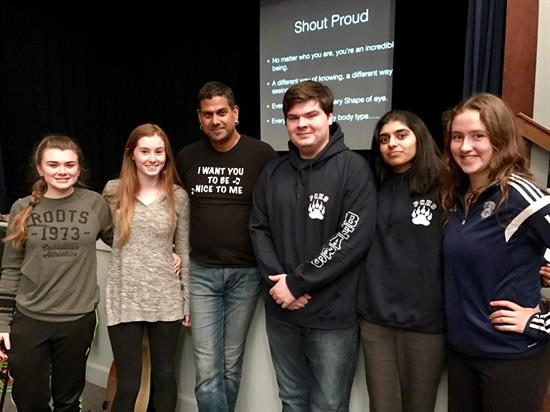Human rights strategist Chris D’Souza speaks with students about gay rights, feminist theory, class and socioeconomics, and racism.

Chris D’Souza hopes his talk on gay rights, feminist theory, class and socioeconomics and racism empowers Port Colborne High School students to create a positive ripple effect in the community.
The motivational speaker and human rights strategist said he was invited to the school by principal Ann Kennerly primarily to empower students to create a safe space, and interrupt language in light of an incident last month in which racist language was spray-painted on the inside of a rural Port Colborne home.
D’Souza, speaking in the school’s theatre, said not only did the hate crime create damage to the people directly exposed to it, but to the community as whole.
“I’m going to attempt to empower them to combat and create their own positive effect.”
He told the students while those affected by the incident may not be part of the Port High community, some people in the audience may know them.
“What happened is damaging emotionally and psychologically to the community, but it’s up to you as student leaders in Grade 11 and 12 to repair the damage.”
His talk also revolved around bias construction and bias deconstruction.
“We are exposed to images around human identity that reinforce a narrative of either privilege around identity or marginalization around identity. So I want people to have a lens, especially if they are working with other individuals, to unpack that positive and/or negative bias.”
D’Souza, who used a slide presentation to get his points across, told the students he wanted them to become deep critical thinkers.
“Deep critical thinkers think about why they are thinking what they are thinking. What you’ve been exposed to think, is what makes you think what you are thinking. We are not born homophobic, racist, sexist or classist.”
Classist, he said, is thinking you are better because you have more.
“I tell students anytime you think you are better than someone else, you are wrong. It’s a wrong way of thinking. Every one of us has different talents and does things differently. The media teaches us we are better because we have more. But I think you are better based on how many good deeds you do every day, how often you make someone feel about themselves, how you lighten the burden of someone’s day. That is what a community is about,” D’Souza said.
dajohnson@postmedia.com